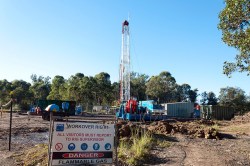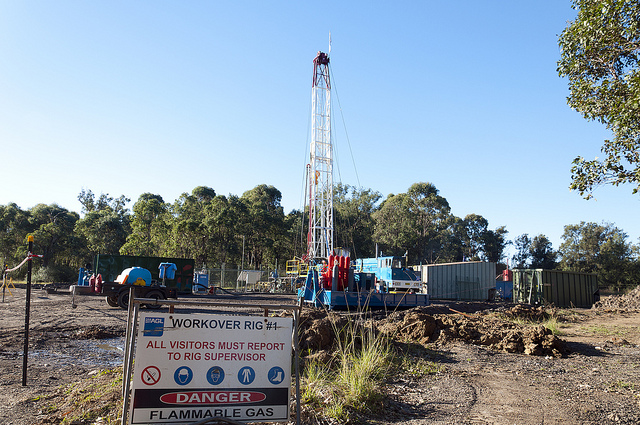
A lovely, elegant fracking rig that is tangentially related to this story. (Photo by Jeremy Buckingham.)
Injection wells used to dispose of fracking wastewater may be correlated with an uptick in earthquakes, according to a researcher at the University of Texas at Austin. The finding echoes other recent research. From a report at EurekAlert:
Most earthquakes in the Barnett Shale region of north Texas occur within a few miles of one or more injection wells used to dispose of wastes associated with petroleum production such as hydraulic fracturing fluids, according to new research from The University of Texas at Austin. None of the quakes identified in the two-year study were strong enough to pose a danger to the public.
The study by Cliff Frohlich, senior research scientist at the university’s Institute for Geophysics, appears this week in the journal Proceedings of the National Academy of Sciences. …
Frohlich analyzed seismic data collected between November 2009 and September 2011 by the EarthScope USArray Program, a National Science Foundation-funded network of broadband seismometers from the Canadian border to the Gulf of Mexico. Because of the high density of instruments (25 in or near the Barnett Shale), Frohlich was able to detect earthquakes down to magnitude 1.5, far too weak for people to feel at the surface.
Frohlich clarified his findings: “You can’t prove that any one earthquake was caused by an injection well. But it’s obvious that wells are enhancing the probability that earthquakes will occur.”
Frohlich’s research was challenged, however, by an expert quoted in an article at Scientific American.
“Drilling never causes earthquakes,” Frohlich said in a telephone interview. “Fracking almost never causes earthquakes … While there are probably millions of hydrofracking jobs, only a few have caused earthquakes and they’ve all been little tiny earthquakes.”
Many high-volume injection wells in the Barnett Shale were not near earthquakes, and the study does not specify what made the difference.
Those two experts happen to be the same person. Frohlich’s point is that fracking itself isn’t correlated to increased seismic activity, but the disposal of fracking wastewater is. Injection wells used for disposal appear to make small earthquakes more likely, he found. It’s a subtle finding, one that was pulled in two different directions.
Philip Bump, however, disagrees with my analysis.



